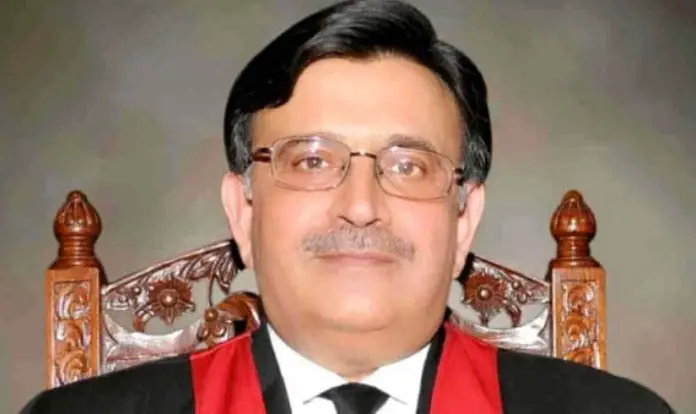Chief Justice of Pakistan (CJP) Justice Umar Ata Bandial on Wednesday remarked that the era of judicial activism was over and every decision would be taken in accordance with the law.
The chief justice made these remarks while hearing a case along with Justice Yahya Afridi and Justice Ayesha A Malik over the illegal appointment and massive corruption in Employees Oldage Benefit Institute (EOBI) and contempt proceedings against the EOBI chairman and secretary.
During the course of proceedings, the chief justice said that even though the Supreme Court had in January 2011 ordered to stop recruitment in EOBI, illegal recruitments were made between September 2011 and May 2012. The names of those who tried to influence the recruitment were included in the NAB report, he added.
He said that Pakistan People Party (PPP) leader Syed Khursheed Shah’s name was also included in the NAB report.
Advocate Aitzaz Ahsan said that Khursheed Shah was not a minister at the time of these appointments. He asked how could there be contempt of court in the NAB case. Khursheed Shah had nothing to do with it, he added.
The chief justice said that if there was contempt of court, then responsibility would have to be fixed as the appointments had been made contrary to the court order. It remained to be determined who violated the court order, he added.
He said that NAB wanted to submit a detailed report on the role of the accused and the anti-corruption watchdog was being given one last chance to submit details.
Subsequently, the court, while seeking details of contempt of court accused and trial from NAB, adjourned the hearing of the case for one month.
Earlier in the day, the apex court suspended the Lahore High Court (LHC) order against the selection of Khudaim-ul-Hajjaj.
A three-member SC bench comprising Chief Justice Umar Ata Bandial, Justice Yahya Afridi and Justice Ayesha A Malik heard the appeal against the LHC’s decision on the issue of selection of Khudaim-ul-Hajjaj (assistants for the Hajj pilgrims).
During the course of proceedings, the additional attorney general told the court that the assistants were selected for the service of pilgrims. The selection of Khudaim-ul-Hajjaj was a requirement of the Saudi government, he added.
The chief justice asked who would pay the Khudaim-ul-Hajjaj for their services.
The AAG said the Khudaim-ul-Hajjaj were the employees of government departments that would pay their salaries.
He said the government was ready to answer the questions of the high court. If the order was not suspended then the pilgrims arriving in Saudi Arabia would face difficulties, he added.
A single-member LHC Multan Bench of Justice Shahid Karim had issued an interim order on the petition of five policemen directing the Religious Ministry not to send the Khudaim-ul-Hajjaj to Saudi Arabia.
The policemen, in their petition, had stated the names of 66 employees, including them, who were selected through balloting from all over Punjab, were sent to the Ministry of Religious Affairs, but they were ignored by the ministry which instead selected its favourite persons as assistants.
During the hearing, the SC remarked that in general, the court did not interfere in the interim orders of the high court, but it was suspending the orders given the difficulties to be faced by the pilgrims.







